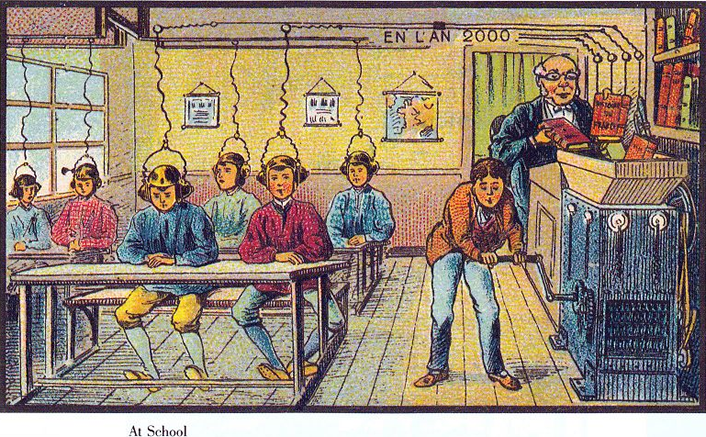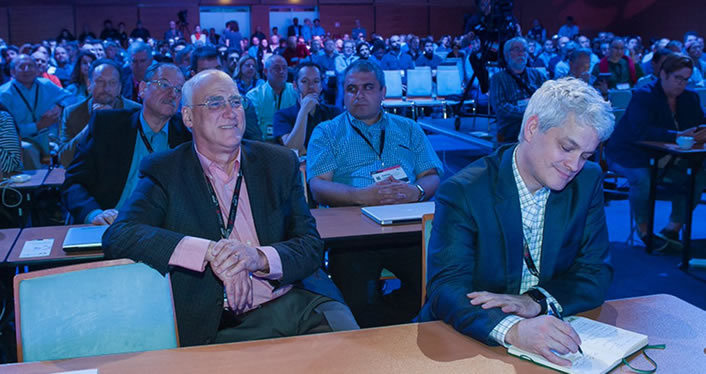On June 1, I celebrated my first anniversary as president/CEO of EDUCAUSE. I don’t think a year has ever gone by faster for me, or been as rewarding, or as busy. Continuing and building on key relationships has been a high priority, so when people ask me if my office is in Colorado or Washington, D.C., I’m inclined to tell them that my office is an aisle seat 20,000 feet above both of the EDUCAUSE offices. My back-of-the-napkin estimate is that I’ve logged around 150,000 miles of travel across the United States in this first year. It’s important for a membership organization to stay connected to those we serve, and it’s inspiring for me to see the innovation and collaboration of our member institutions.
In my anniversary month, I had the pleasure of connecting with colleagues in Europe. EDUCAUSE members include 300 colleges and universities from 47 countries. My first stop was EUNIS2016, where I was honored to give the opening keynote. Since the theme of the gathering was “crossroads where the past meets the future,” I couldn’t resist putting together a presentation reflecting some of the ideas I’ve been considering about “the history of the future of education technology.” My talk looked at historical representations of the future, such as the one below, and explored what they can tell us in 2016.

Illustration by Jean-Marc Côté (“A 19th-Century Vision of the Year 2000,” Public Domain Review)
Speaking of the past, as the citizen of a country less than 250 years old, I felt my head spinning as I listened to Pericles A. Mitkas, the rector of the host university, share details about the Aristotle University of Thessaloniki, including the fact that this year the university will be celebrating the 2400th birthday of local notable and namesake Aristotle.
EUNIS shares a mission similar to that of EDUCAUSE, and it has reach across Europe (120 institutions in more than 30 countries). I especially enjoyed the fact that the new EUNIS Board of Directors president, John Murphy, is director of Information Systems Services at Trinity College Dublin, where I earned my master’s degree three decades ago. In addition to the keynote, I co-presented in a session on the next generation digital learning environment (NGDLE) with EDUCAUSE Board Chair Bruce Maas, EDUCAUSE Board Member Jack Suess, and IMS Global Learning Consortium CEO Rob Abel. There is a great deal of European interest in standards-based approaches in general and this work in particular.
During and following this event, I had excellent opportunities to engage in substantive conversations with members of two U.K. higher education organizations: UCISA and Jisc. I met with Peter Tinson, UCISA executive director, who gave me the chance to learn more about this key information systems and technology organization that represents almost all major colleges and universities in the United Kingdom. Peter is also president of the board of CHEITA [http://www.cheita.org/], which aims to share best practices across member associations and, by extension, the individual institutions that make up those associations. EDUCAUSE, like UCISA, is a member of CHEITA. I also had a one-on-one conversation with Paul Feldman, Jisc chief executive, and meetings with many of his key staff. Some of you may be aware that EDUCAUSE collaborated with Jisc in 2015 on a joint report on the role of strategic leadership. I believe there are promising opportunities for further collaboration with these and other organizations in Europe.
My last engagement was the TNC16 Conference in Prague, with its theme of “Building the Internet of People.” Bruce, Jack, and I presented on NGDLE here as well, and I was able to participate in two strategic meetings exploring opportunities for collaboration with the groups I mentioned above, as well as with SURF (a collaborative Dutch organization), GÉANT (a pan-European advanced networking organization), and others. The focus of TNC is the crucial network backbone that makes research possible all around the world, and Internet2 plays a key role here (thanks to Internet2 President Dave Lambert for connecting me to leaders in this thriving community). The highlight for me was a three-hour meeting, with leaders from around the world, in which we imagined how we can collaborate in ways that will be mutually rewarding and beneficial to the members we serve.
As someone who was once an international student, I was not at all surprised to find that connecting with international colleagues was exhilarating. One minute I was talking to a colleague from France, then China, then Iran, then Sweden, then Togo, then. . . . If you had asked me, before these trips, what I thought would be inspiring, I would have predicted it would be discovering and uncovering all the challenges and opportunities we have in common. Looking back on my conversations, however, I realize that it was also deeply insightful to learn about our differences. With different cultures, traditions, regulations, and expectations, we have all been approaching a common set of challenges, in our unique ways. We all have much to learn from the different practices that have emerged and that are emerging still.

Internet2 President/CEO H. David Lambert and EDUCAUSE President/CEO John O’Brien listening to former NYU President John Sexton at TNC16 in Prague (https://twitter.com/Internet2/status/743462204054319104)

John O’Brien is President and CEO of EDUCAUSE.
© 2016 John O’Brien. The text of this blog is licensed under the Creative Commons Attribution-NonCommercial-NoDerivatives 4.0 International License.
